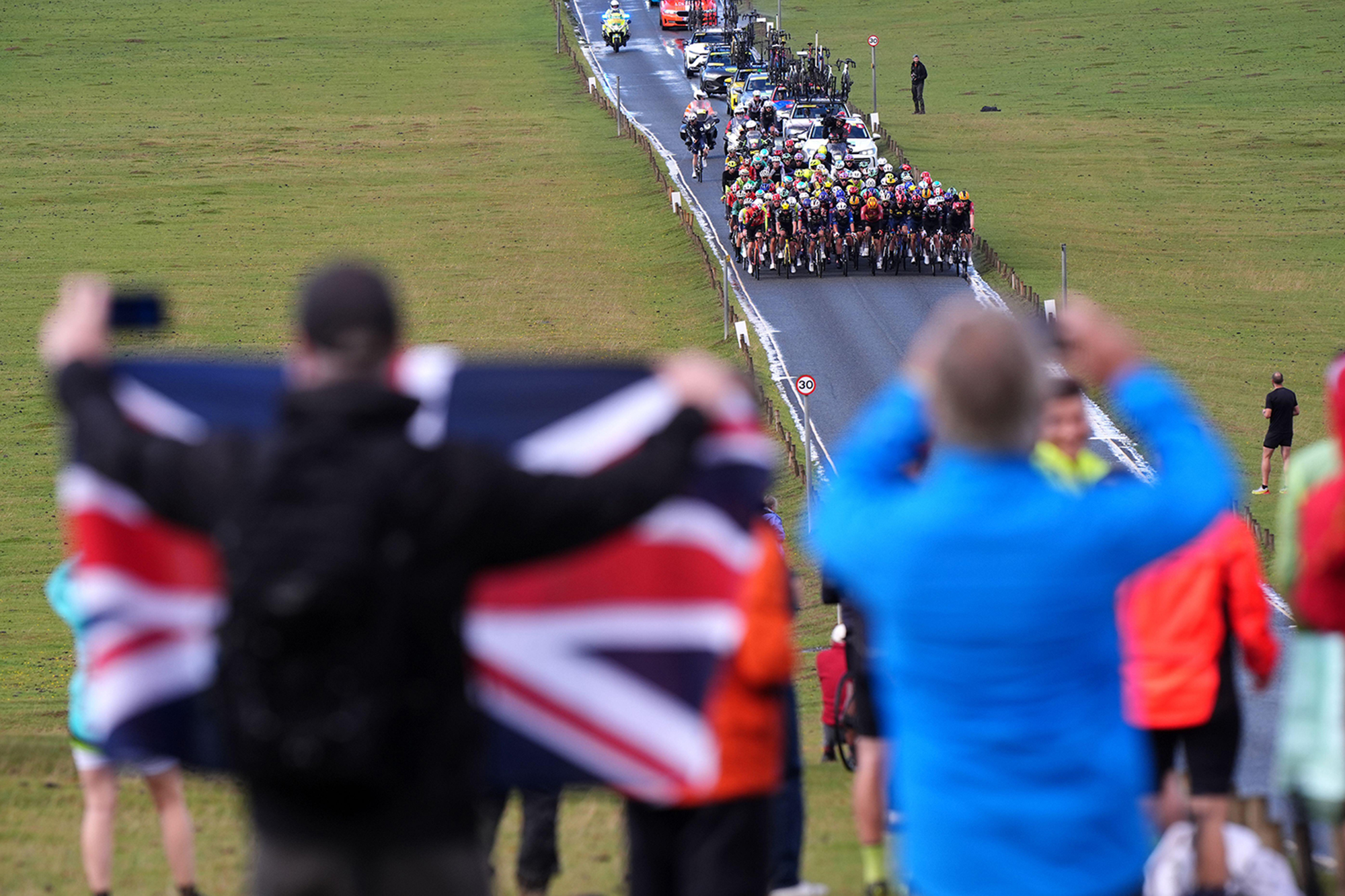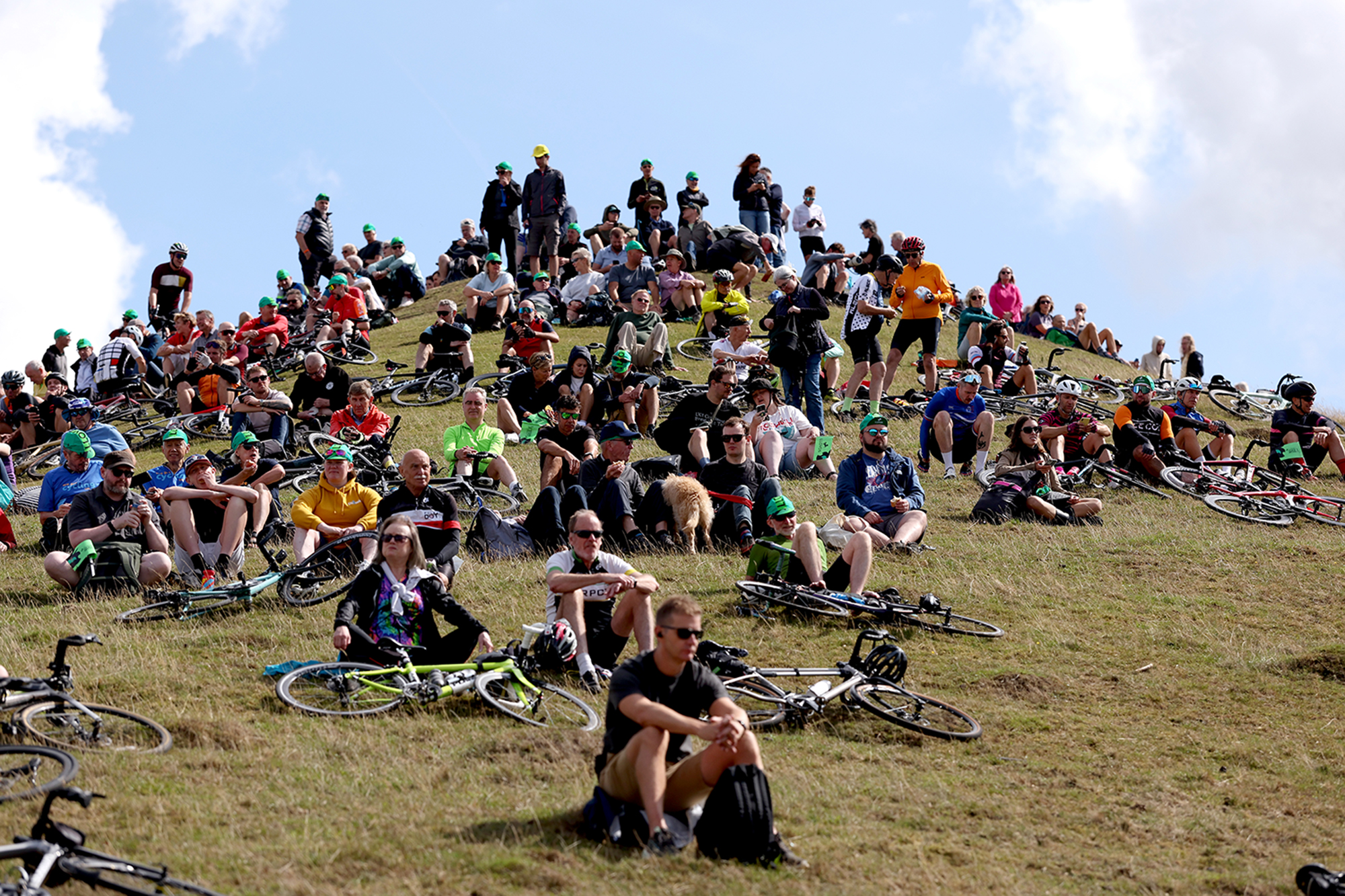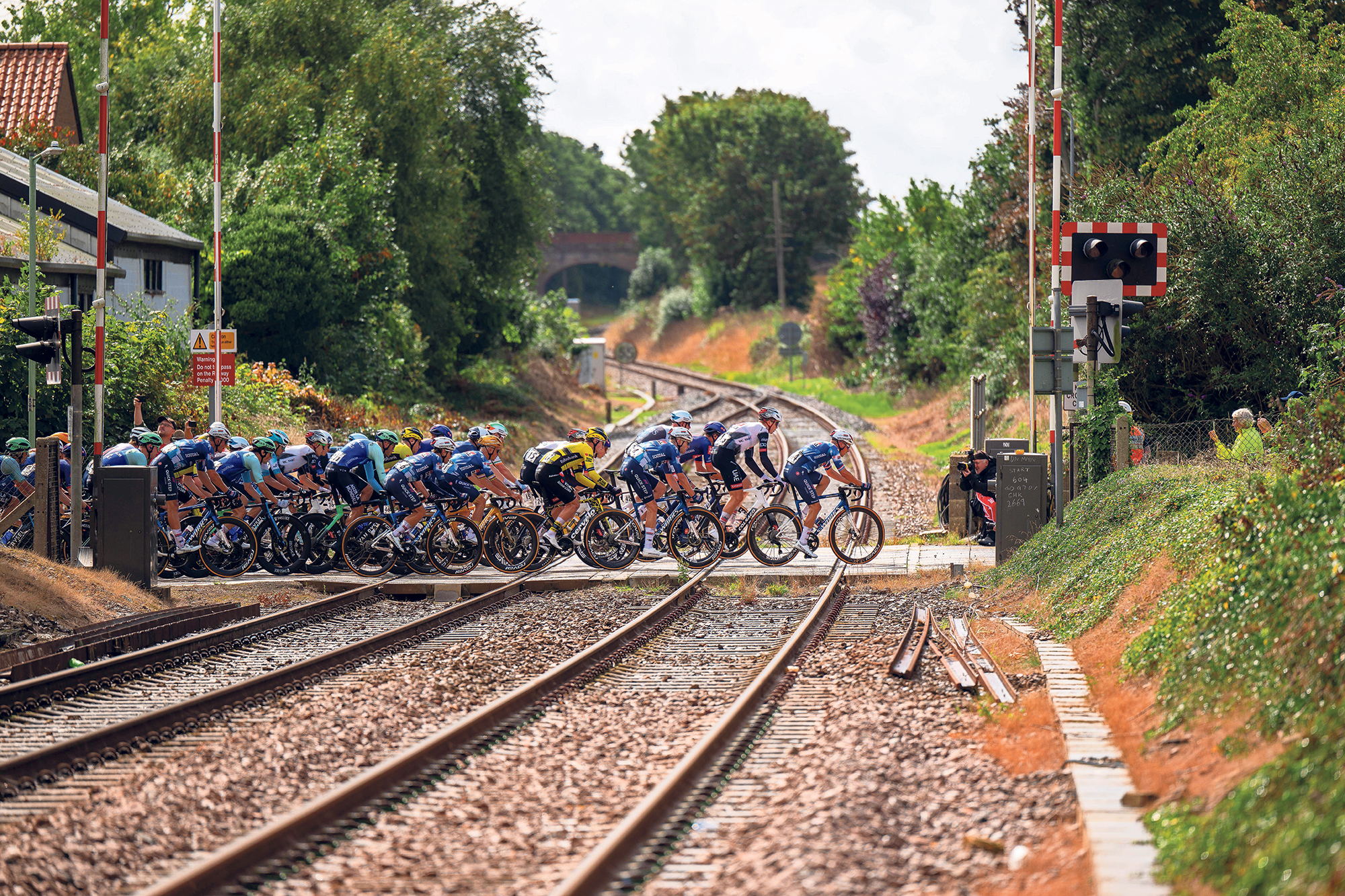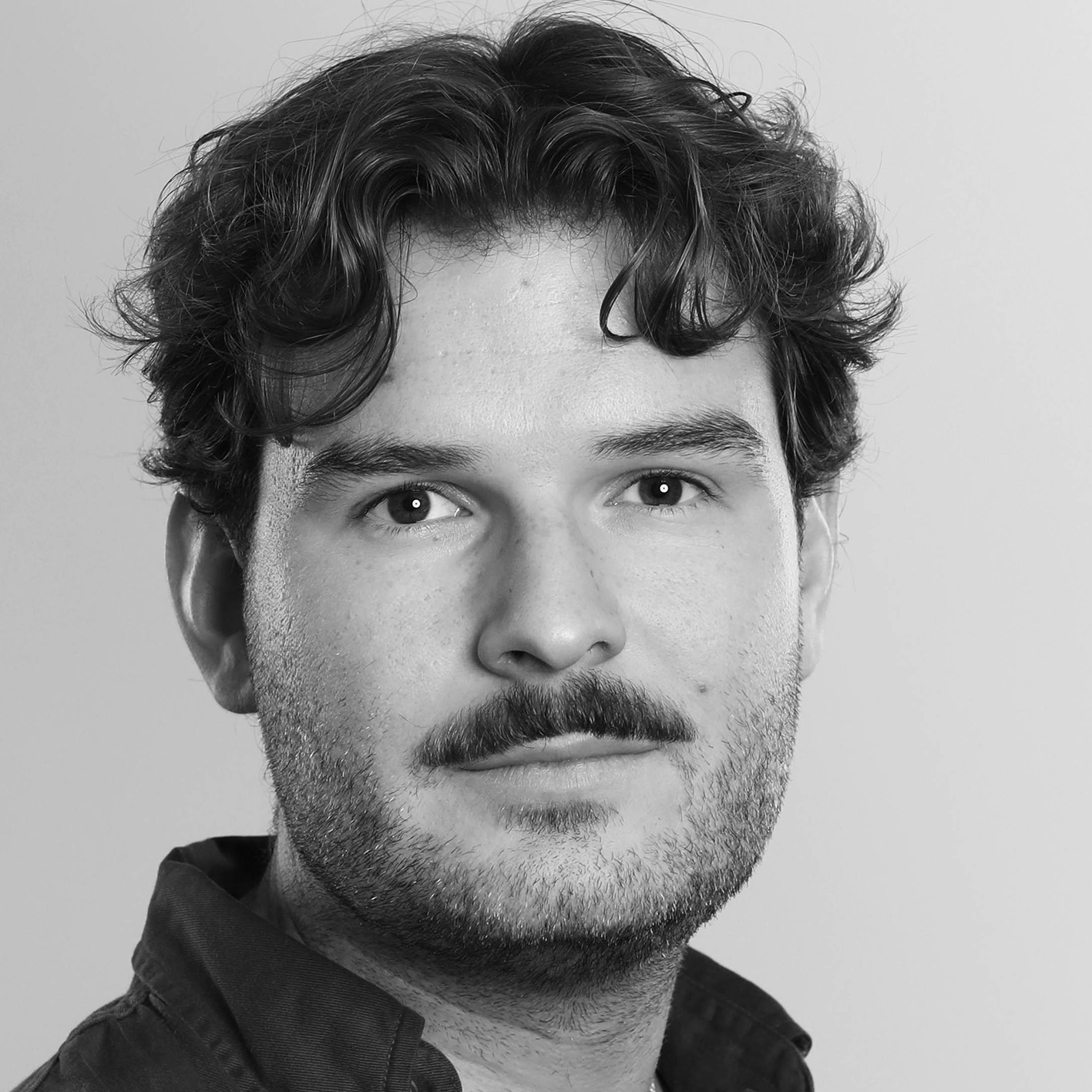In a washed-out caravan in a B&M superstore car park in Stowmarket, six British cycling prodigies are preparing for the nation’s biggest men’s race. Ben Wiggins, former junior world champion and the mulleted scion of Bradley, has his feet on the dashboard. At 6ft 3in, the 22-year-old former individual pursuit world record-holder Josh Charlton has to duck through the door frame. Fans and shoppers weave around the glossy team buses as if perusing a car boot sale, unimpeded by any semblance of security.
In this walled corner, the Great British Cycling Team are British road cycling in microcosm – elite talent increasingly inexplicably enduring through ever-diminishing infrastructure and support. Apparently this is one of the more spacious municipal spaces being used as a race base across the men’s Tour of Britain’s six stages, starting in Suffolk before weaving through Buckinghamshire and Warwickshire, ending today in Cardiff.
The start and end point of stage two, Stowmarket, is tucked between Bury St Edmunds and Ipswich. An archetypal high street rapidly frays at the edges, all charity shops and peeling paint, takeaways peddling e.coli and disappointment. The Star Convenience Store was recently shuttered “due to criminal activity on the premises”. Its crime? Illegally selling vapes.
This week doubles as the Geraint Thomas Retirement Tour, the final race of the only Tour de France winner ever born on this flag-fetishing isle. In cycling’s ever-glamorous tradition, even Thomas describes his accommodation before the first stage as “a right dump”. The final stage will begin outside Newport’s Geraint Thomas Velodrome. Mercifully, Welsh flags outnumber all others around Stowmarket, a sign of Thomas’s everyman magnetism and relative stardom. With Chris Froome’s career also in peril after a serious injury this week, British cycling could be entering a superstar vacuum.

Photograph by Bradley Collyer/PA Images/Alamy
But there has never been such depth and breadth of promise here, especially from the men: 24 of the 114 Tour of Britain starters are British, with another 11 competing in the Vuelta a España. Another 11 rode the Tour de France in July, equalling a record set last year, and four on the women’s Tour. All are 24 or younger.
Oscar Onley, the elfin Scot, finished fourth on this year’s Tour de France. Visma-Lease a Bike’s Matthew Brennan, 20, has won an astonishing 12 races in his first year as a professional, including the third stage of the Tour of Britain. Joseph Blackmore, 22, won last year’s Tour de l’Avenir – Tour of the Future – following the likes of Tadej Pogačar and Egan Bernal, while Noah Hobbs (21) and Elliot Rowe (19) both won stages in this year’s event. Josh Tarling, 21, is among the world’s finest time-triallists. Samuel Watson, 23, finished third in Stowmarket for Ineos. At 26, Olympic gold medallist Tom Pidcock is now challenging in the Vuelta. On the women’s side, Pfeiffer Georgi (24) excels on the road, Emma Finucane (22) on the track. “It’s difficult to say it’s a golden generation because I can’t remember it not being,” Matt Brammeier, GB’s director sportif, tells The Observer. Talent has never been the issue.
And yet everyone speaks of a sport in crisis, especially below the elite level. The Tour of Britain almost collapsed in 2024, bailed out by sponsorship from Lloyd’s, with the women’s race now only four stages. The Tour de Yorkshire never returned post-pandemic. The RideLondon Classique men’s and women’s races were cancelled for 2025 at least. The Junior Tour of Wales, Britain’s premier junior men’s race, was axed in June, perhaps the most concerning of all the cuts given the precarious position of youth cycling more generally. The National Road Series had 10 open races in 2019, now down to seven. Welsh Cycling, rebranded as Beicio Cymru, has pivoted towards cycling tourism.
This makes road cycling something of an outlier in British sport, without world-leading competitions or infrastructure. England usually acts as an aircraft hangar for the world’s sport, for its investment, but somehow little of that has reached cycling. As one British cycling employee puts it to me: “It’s long been clear trickle-down economics just doesn’t work in cycling.” British Cycling’s Elite Road Racing Task Force produced 16 “broad recommendations” to improve the state of the sport in January 2024, but most people you speak to say the issue begins and ends with “needing more money”.
Related articles:
The vast finances of most World Tour teams help preserve the veneer of functionality by relieving the burden on British Cycling. While most riders were traditionally not signed until the under-23s, many now join development squads at 18, as was the case with Brennan and Onley. Wiggins and his Great Britain team-mate Josh Golliker, 21, are also both on World Tour development teams. For comparison, Thomas didn’t join a World Tour team until he was 24, Froome 25.

Photograph by Alex Livesey/Getty Images
Beyond that, as recently as 2019 there were six British UCI Continental teams – effectively cycling’s third tier – but the final two folded earlier this year. For comparison, the Philippines have four, Iran and Rwanda three each. This forces those on the cusp of professionalism to look elsewhere, the two GB Tour of Britain debutants had to, both joining French club teams. Unless you join a World Tour development team, your options are increasingly limited.
Newsletters
Choose the newsletters you want to receive
View more
For information about how The Observer protects your data, read our Privacy Policy
“It is definitely a shame that there’s not the clear pathway there was pre-Covid,” Ben Wiggins said. “I wish it got more attention, but it’s also the state of professional cycling. Just look around here [gestures at B&M]. It’s a shame, the attitude towards cycling from some people in this country.”
The Tour of Britain is still a prestigious and well-regarded race, showing tangible signs of recovery, even if it clashes with the more prestigious Vuelta. Remco Evenepoel, one of the sport’s few true superstars, is here, while nine World Tour teams competing in 2025 is the most since 2019.
The perceived British cycling boom has long been pronounced dead, a heady pre-Brexit phase where there was no problem marginal gains could not solve. Between March 2023 and last December, British Cycling membership dropped nearly 11%, to 122,982, from a peak of 165,000 in July 2020. Cycling is now a Union Jack sport in a St George’s Cross age, the last bastion of London 2012.
Anecdotally, the trigger for this freshly golden talent cycle was London 2012 and Bradley Wiggins’s 2012 Tour win. Charlton said that “was the first time I really knew what I wanted to do with my life”. Perhaps all cycling really needs to survive is a few superstars. Onley and Pidcock have both spoken about being inspired by watching Team Sky’s domination on ITV. Shame the Tour de France isn’t continuing its 40-year tenure on free-to-air TV.
The peak of the cycling boom was the 2014 Tour Grand Depart – 4.8m people watched the first three stages in person – and the Tour will return to Britain in 2027. The men’s event begins in Edinburgh, with the women’s event also beginning in the UK. Brennan has said “starting Stage 2 in the yellow jersey would be cool”, an increasingly realistic aim. This could inspire the next golden generation. But what will be left to help them realise their potential?
Feature photograph by Josh Wheeler/Alamy Live News



